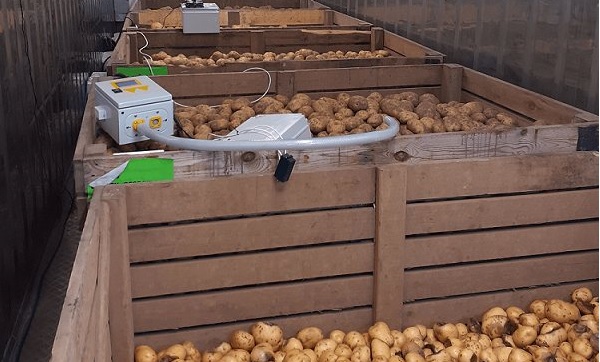
A new root crop disease technology has entered its final stage of testing ahead of being brought to market.
Researchers behind the TuberSense project say the technology could potentially revolutionise the potato supply chain by helping to boost crop yield and quality.
Its first phase has provided novel insights into the range of diseases and defects that, unless detected early, can compromise the overall quality of the crop that enters the supply chain.
Through this phase, scientists say they have gained an understanding of which diseases are most distinguishable through the use of gas sensing technologies.
The team have also become more aware of which defects may not be detectable through such means.
The project is a cross collaborative effort from agri-tech business B-hive Innovations, with partners including the James Hutton Institute and potato producer Branston, among others.
To ensure optimal testing conditions, the team have been conducting experiments using a mix of field testing with growers alongside semi-controlled trials, including the use of industrial shipping containers.
A TuberSense system was shipped to a sweet potato supplier in North America for further testing, as the project looks to expand the breadth of crop the technology can be compatible with.
Sweet potatoes can be even more susceptible to disease and defects, especially considering long shipping times, and therefore there is a higher rate of crop wastage.
Dr Barbara Correia, who is a scientist taking part in the project, said the team have made some "great breakthroughs" during the first phase.
She said: “Research and development combined with market research has made it clear that growers and packers of root crops require greater insights into disease and defect detection at the earliest point possible.
“While we have made some great breakthroughs during the first phase of the project, we have a lot of confidence from our ongoing analysis to trial a 2.0 iteration - that will extract even more insights into using volatile markers for gas sensing in stored crop.
“By undertaking detailed data analysis, we believe that we can detect some tuber diseases and defects more accurately through further refinements to the underlying technology, and we are working through making those changes."
To better understand the demand from growers, the research team embarked on a 12-week Scaling the Edge project funded by with UK Research and Innovation (UKRI).
Three quarters of the growers faced disease and defect problems with their crop, and the majority of these are keen that a gas sensing system for early detection is made available.
Researchers are now starting to develop the second iteration to feature an improved gas sensor, with aims to commence testing with units by the end of the year.
Dr Correia said the project was also exploring technology from other partners, including graphene-based sensors from Altered Carbon.
"We have partnered with recently, alongside our own bespoke sensor array to see how much we can push the limits of sensitivity of the system," she added.
“By the end of the project, we want to be in a position where our findings can inform the production of commercial detection systems for the industry.”
